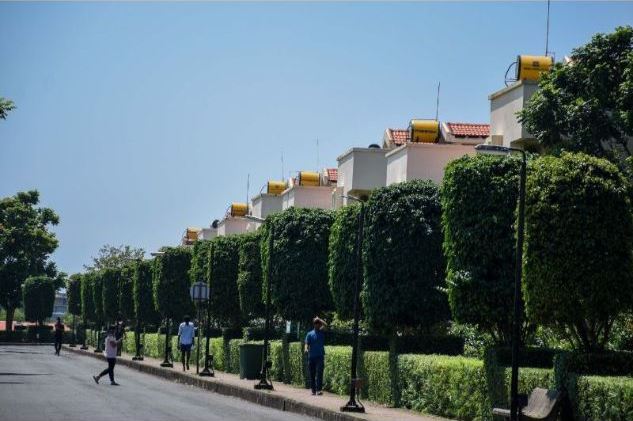Campus Contribution towards Sustainable Environment
Sustainability
Campus is steadily moving towards sustainability in electricity and water usage. Water conservation and systematic distribution of portable water supply is managed and monitored efficiently. Water used by campus residents is treated scientifically and recycled back to use in the campus. Campus had aimed to reduce its dependence on conventional power. In this regard, power plants enabled by solar power and energy saving fixtures have been introduced and installed in the campus.
Usage of transport in the campus is very limited. 3500+ students residing in the campus are not permitted to use their private transport inside the campus and are encouraged to use public transport for their local movement outside the campus. Students use covered corridors to walk from their hostels to academic block within the campus.
Campus maintains lush green gardens with a rich collection of flora and fauna. Every year during the monsoon, tree plantation drives are conducted with the help of the students.
Energy Conservation

- Over 60 solar water heaters of 500 liters each are provided at all 20 hostels which accommodate 3500+ students.
- Around 40 standalone solar powered street lights are installed in the campus, which is estimated to save around 2,600 kW of electricity annually.
- Around 85% of the street lights (total 275) in the campus are connected to off-grid solar power plant of 19 kW per day. These street lights function on solar power for about six to eight hours every night, which is estimated to save around 41,000 kW of electricity annually. After exhausting the solar power, these street lights function on conventional power.
- Since 2016, hostels, residential quarters, academic and administrative blocks constructed as part of the infrastructure expansion are provided with LED fixtures to reduce consumption of energy.
- Similarly, in the earlier infrastructure, existing CFL, tube lights and other electrical fixtures are being replaced with energy saving LED fixtures in a phased manner.
- In the coming years, it is planned to install 50 to 100 kW on-grid solar power systems thus enhancing the use of renewable energy in the campus.
Water Conservation
- Five groundwater recharge points are created across the campus. In this, the surface runoff water during monsoon is directed to a designated area which then percolates in the ground resulting in groundwater recharge. Many such recharge points are being planned across the campus in the coming years.
- All overhead tanks and water coolers are fitted with floats, sensors and other mechanisms to shut the water supply and avoid overflow.
- Overhead tanks which are filled with pressurized supply of water through pumps are fitted with actuator valves for avoiding overflow.
Transportation
- Movement of transport is very limited in the campus. 3500+ students residing in the campus are not permitted to use their private transport inside the campus.
Recycling
- The Sewage Treatment Plant (STP), with the capacity of 600 cumec is working round the clock to treat sewage generated by residents of the campus.
- In the recently completed hostels and residential quarters, the STP treated water is supplied to flush tanks of EWC through dedicated supply network.
- The treated water is also recycled by using it to maintain lush green garden.
- The sludge generated at STP is transferred to drying bed in the vicinity of STP which is used as manure after drying.
- Domestic waste generated in the campus at residences, hostels, messes, etc. is segregated at source into dry, wet and medical waste.
- Wet waste is treated in a bio-gas plant and composter machine, with the capacity to treat one ton of waste each on daily basis.
- Dry waste is further segregated as per norms and handed over to GSPCB approved vendor for recycling.
- All garden waste is composted and converted into manure which is used to maintain the garden.
Environment Protection and Awareness Club (EPAC) by students:
Activities conducted in 2018-19
- Beach cleanup drive
- Campus cleanup drive - in association with Nirmaan
- Slithers (annual snake awareness program)
- Paw Pals - visit to animal shelter
- Through Nature's lens, Green Quiz and Best out of Waste held during Quark 2019